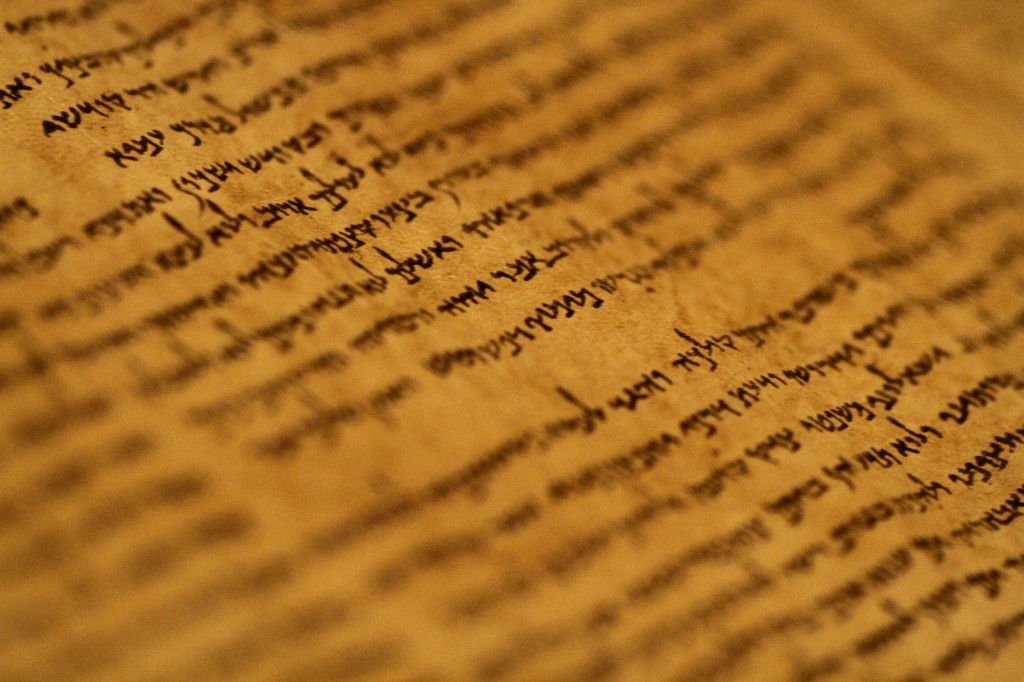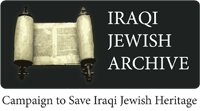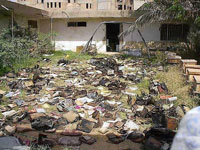Keep the Iraqi Jews’ Legacy Safe
By Cynthia Kaplan Shamash, New York Times. November 7th, 2013
“Seventy-five years ago, about 120,000 Jews lived in Iraq. In Baghdad, they were prominent in business and the professions — doctors, lawyers, bankers, professors, musicians, writers, artists, engineers. Last summer, a visitor just back from Iraq told me he could account for only five Iraqi Jews alive in the country. Not 5,000. Not 500. Five. They are too old to leave. When they die, there will be none.
By Lyn Julius, Times of Israel. October 18th, 2013
“Now that the US government shutdown is over, normal service is being resumed. Iraq is coming to the National Archives building in Washington DC – or more precisely, an exhibition of 24 Iraqi-Jewish artifacts, Discovery and Recovery.
I will not dwell on the controversy surrounding the ‘Jewish archive’, which the US military salvaged from a sewage-filled basement in Baghdad in 2003.”
By Linda Menuhin, Jerusalem Post. September 17, 2013
“More than 40 years have passed since I fled Iraq, yet Iraq has never left me. Time and again I earnestly tried to bury my past, without much success. This year on Yom Kippur I honored my father’s memory with a sense of fulfillment.
On the eve of Yom Kippur in 1972 my father, a distinguished lawyer in Iraq, disappeared. He was the first Jewish person to disappear during the Ba’athist regime’s years in power.”
Does Iraq deserve the return of its Jewish archive?
By Ben Cohen, JNS.org. September 15, 2013
“A few years ago, in response to a Palestinian critic who made a disparaging remark about the fact that I don’t speak Arabic, I felt compelled to write an article explaining why that is the case. I said that under different circumstances, I could have been born in an Arab country and grown up speaking Arabic. My father’s family had been settled in Iraq for generations, but they fled to England in 1941—the same year that Baghdad’s Jews were convulsed by a June pogrom known as the farhud—presaging a much larger exodus of Iraqi Jews over the next decade.”
Don’t Return the Iraqi Jewish Archive
By Joe Samuels, Times of Israel. September 10, 2013
“My Arabic name is Yusuf Sasson Shumail. I was born in Taht Al Takia, in the old city of Baghdad, Iraq on December 31,1930. In 1941, I survived the anti-Jewish pogrom, known as the Farhud. During the Farhud, which happened during the holy Jewish holiday of Shavuot, Baghdad’s Jewish population came under the attack of vicious mobs.”
Iraqi Jewish Artifacts – Ownership?
By Rachel Wahba, Times of Israel. September 3, 2013
“After a presence of over 2,500 years, the ancient Jewish community of Iraq was destroyed in the early 1950’s. A community of less than 6,000 Jews remained until 1967 when it became intolerable and terrifying to stay put.”
Reflections on the Archive by an Iraqi Jew
By Sasson Azoory, Jerusalem Post. September 3, 2013
“My name is Sasson Azoory and I left Baghdad, Iraq in 1959 to study in the United Kingdom. When I left, Iraqi General Abd al-Karim Qasim was in the midst of his three-year rein. During this small window of time Iraqi Jews were granted freedom of movement and I am one of the few Jews who was able to leave the country using my Iraqi passport.”
The Jewish archive must not go back
By Lyn Julius, Times of Israel. August 28, 2013
“One day in 1984, the Iraqi dictator Saddam Hussein sent his henchmen to Bataween synagogue, one of the last working houses of Jewish prayer in Baghdad. The men carted off a trove of books and documents retrieved from Jewish homes, schools and synagogues. The material had been deposited for safe keeping in the ladies’ gallery.”
By Avram Piha, Times of Israel. July 13, 2012
“I spent Sunday morning with my landlord ensuring we were leaving his apartment in good shape. When he confirmed all was ok, I handed over the keys and asked him if he had time to tell me a little bit about his life. Eli had on numerous occasions mentioned his childhood memories of Iraq, and the difficulty of being a refugee in Israel in the 1950s, but we had never had the chance to sit down and really talk about it. We both decided there was no better time than the present, so we sat down on a bench and got to it”
Claiming Babylon’s stolen treasures
By Ronen Tal, YNET News. May 29, 2006
“David Nawi still remembers his grandma’s home in Baghdad. “It was a huge house with many rooms. Sometimes all the family members lived there,” he recalls. Fifty-five years ago his family left Iraq and immigrated to Israel, leaving all of their assets behind. He was only eight years old”










